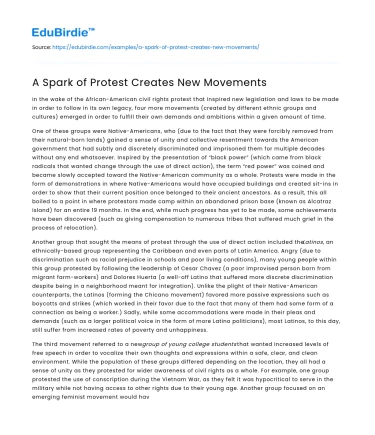In the wake of the African-American civil rights protest that inspired new legislation and laws to be made in order to follow in its own legacy, four more movements (created by different ethnic groups and cultures) emerged in order to fulfill their own demands and ambitions within a given amount of time.
One of these groups were Native-Americans, who (due to the fact that they were forcibly removed from their natural-born lands) gained a sense of unity and collective resentment towards the American government that had subtly and discretely discriminated and imprisoned them for multiple decades without any end whatsoever. Inspired by the presentation of “black power” (which came from black radicals that wanted change through the use of direct action), the term “red power” was coined and became slowly accepted toward the Native-American community as a whole. Protests were made in the form of demonstrations in where Native-Americans would have occupied buildings and created sit-ins in order to show that their current position once belonged to their ancient ancestors. As a result, this all boiled to a point in where protestors made camp within an abandoned prison base (known as Alcatraz Island) for an entire 19 months. In the end, while much progress has yet to be made, some achievements have been discovered (such as giving compensation to numerous tribes that suffered much grief in the process of relocation).
Save your time!
We can take care of your essay
- Proper editing and formatting
- Free revision, title page, and bibliography
- Flexible prices and money-back guarantee
Another group that sought the means of protest through the use of direct action included the Latinos, an ethnically-based group representing the Caribbean and even parts of Latin America. Angry (due to discrimination such as racial prejudice in schools and poor living conditions), many young people within this group protested by following the leadership of Cesar Chavez (a poor improvised person born from migrant farm-workers) and Dolores Huerta (a well-off Latino that suffered more discrete discrimination despite being in a neighborhood meant for integration). Unlike the plight of their Native-American counterparts, the Latinos (forming the Chicano movement) favored more passive expressions such as boycotts and strikes (which worked in their favor due to the fact that many of them had some form of a connection as being a worker.) Sadly, while some accommodations were made in their pleas and demands (such as a larger political voice in the form of more Latino politicians), most Latinos, to this day, still suffer from increased rates of poverty and unhappiness.
The third movement referred to a new group of young college students that wanted increased levels of free speech in order to vocalize their own thoughts and expressions within a safe, clear, and clean environment. While the population of these groups differed depending on the location, they all had a sense of unity as they protested for wider awareness of civil rights as a whole. For example, one group protested the use of conscription during the Vietnam War, as they felt it was hypocritical to serve in the military while not having access to other rights due to their young age. Another group focused on an emerging feminist movement would have demonstrated in order to gain rights to birth control. Meanwhile, on another campus, someone else would have protested the lack of minority rights and the awareness therefore of. In any case, these protests created a sense of change in the air as people wanted more ways to express their true potential.
Lastly, the fourth movement involved the small yet visible homosexuals as they tried to push for more acceptance within the general public community. Frustrated over the lack of gay politicians in the civil service sector of jobs, some held signs around the White House in order to spread awareness of such an issue occurring in the first place. However, things became more tense in 1969, as multiple police officers tried to raid a gay bar known as the Stonewall Inn. By doing so, many more protestors joined the ranks as they were infuriated over the lack of respect given to them. In the end, while the gay movement has been controversial at times, it has been more accepted in modern times as the term LGBT.
So, a spark of protests created four new movements in its wake.






 Stuck on your essay?
Stuck on your essay?

